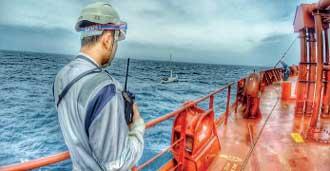Reply To:
Name - Reply Comment
By Sheain Fernandopulle
 On Seafarer Day 2024, we commemorate the invaluable contributions of seafarers around the globe while reflecting on the profound challenges they encounter in their demanding profession. As we celebrate their dedication and bravery, it is crucial to shed light on the multifaceted obstacles they confront daily, often unseen by those on land.
On Seafarer Day 2024, we commemorate the invaluable contributions of seafarers around the globe while reflecting on the profound challenges they encounter in their demanding profession. As we celebrate their dedication and bravery, it is crucial to shed light on the multifaceted obstacles they confront daily, often unseen by those on land.
In 2024, the campaign underscores the invaluable contribution of seafarers to creating a safer maritime workplace. Their dedication and adherence to safety protocols are instrumental in preventing accidents and ensuring operational continuity at sea. Seafarers play a vital role in maintaining vessel integrity, navigating hazardous conditions, and responding swiftly to emergencies. Their expertise and professionalism not only bolster maritime safety but also foster a culture of responsibility and accountability within the industry. By recognizing and supporting seafarers, we strengthen the foundation of global maritime trade and uphold standards that prioritize human welfare and environmental stewardship. This campaign serves as a reminder of the indispensable role seafarers play in safeguarding our oceans and underscores the collective responsibility to prioritize their safety and well-being.
Seafaring has always been an essential yet arduous occupation, requiring individuals to endure extended periods away from their homes and loved ones. The isolation inherent in their work is perhaps one of the most poignant challenges faced by seafarers. Months spent aboard vessels, navigating vast oceans, can lead to profound loneliness and mental strain. The absence of regular human interaction, compounded by the unpredictable nature of their tasks, contributes significantly to the mental health issues prevalent among seafarers.
 Moreover, the physical demands of the job cannot be understated. Seafarers often work long hours under strenuous conditions, facing harsh weather, heavy machinery, and hazardous cargoes. The risks associated with maritime transport, including accidents, injuries, and even piracy, underscore the perilous nature of their profession. Despite advancements in technology and safety protocols, seafarers continue to operate in environments where the margin for error is slim, requiring them to remain vigilant and resilient at all times.
Moreover, the physical demands of the job cannot be understated. Seafarers often work long hours under strenuous conditions, facing harsh weather, heavy machinery, and hazardous cargoes. The risks associated with maritime transport, including accidents, injuries, and even piracy, underscore the perilous nature of their profession. Despite advancements in technology and safety protocols, seafarers continue to operate in environments where the margin for error is slim, requiring them to remain vigilant and resilient at all times.
Besides, the regulatory framework governing the maritime industry presents its own set of challenges. Seafarers must navigate complex international laws and regulations, which vary across jurisdictions and can impact their rights, working conditions, and overall well-being. Issues such as flag state responsibilities, port state control, and compliance with international standards often pose administrative burdens that seafarers must contend with while fulfilling their duties onboard.
One of the most pressing concerns in recent years has been the plight of seafarers stranded at sea due to crew change restrictions, exacerbated by the COVID-19 pandemic. Thousands of seafarers found themselves trapped onboard vessels beyond their contracts, unable to disembark or return home due to travel restrictions and quarantine measures. This humanitarian crisis not only highlighted the resilience of seafarers but also underscored the need for global cooperation to ensure their fundamental rights and well-being are protected.
Furthermore, the economic uncertainties of the maritime industry add another layer of complexity to seafarers’ lives. Fluctuating freight rates, market demands, and geopolitical factors can impact job security and wages, affecting seafarers’ livelihoods and future prospects. The financial pressures faced by seafarers are compounded by the need to support their families back home, often in regions where economic opportunities are limited.
In addressing these challenges, it is imperative for stakeholders across the maritime sector to prioritize the welfare of seafarers. This includes implementing policies that promote fair labor practices, uphold international standards, and ensure adequate training and support for seafarers throughout their careers. Initiatives aimed at improving mental health services, facilitating efficient crew changes, and enhancing safety measures onboard vessels are critical steps towards creating a more sustainable and supportive environment for seafarers worldwide.
Moreover, raising awareness about the invaluable role of seafarers in global trade and transportation is essential. Public recognition of their contributions not only honors their dedication but also encourages advocacy for their rights and well-being. By fostering greater understanding and appreciation for the challenges faced by seafarers, we can galvanize collective action to address systemic issues and create positive change within the maritime industry.
Looking ahead, as we celebrate Seafarer Day 2024, let us reaffirm our commitment to seafarers’ rights and dignity. Let us recognize their resilience in the face of adversity and acknowledge their role as guardians of the seas. By standing in solidarity with seafarers and advocating for their welfare, we can ensure that they continue to navigate the challenges of their profession with courage and fortitude.
In conclusion, Seafarer Day serves as a poignant reminder of the sacrifices made by seafarers and the challenges they confront daily. It is a call to action for governments, industry leaders, and civil society to work together in safeguarding the rights and well-being of seafarers worldwide. As we commemorate this day, let us honor seafarers’ contributions with gratitude and commit to supporting them in their vital role in sustaining global trade and connectivity.